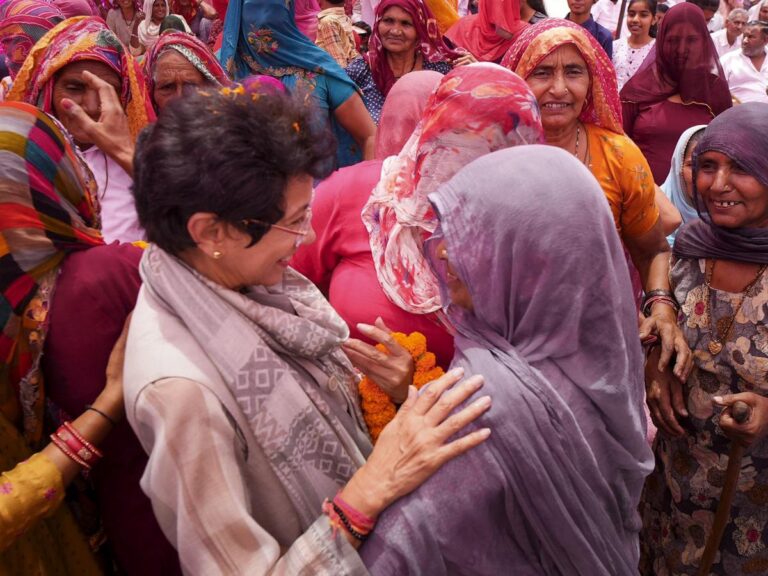While the Congress and the Bharatiya Janata Party (BJP) finished tied in Haryana’s Lok Sabha elections, winning five of the 10 seats each, the agricultural state is gearing up for a new political battle with state assembly elections due in less than 100 days.
With the state’s two major political forces, the Indian National Congress and the Bharatiya Janata Party, banking heavily on the Jat and Other Backward Classes (OBC) votes respectively, the Scheduled Castes (SC), who constitute around 20 per cent of the state’s population as per the 2011 census, could be a deciding factor in the state assembly elections.
The voting pattern of SCs in Haryana in the past decade, judging by the number of seats held by various parties, shows that while the community voted overwhelmingly for the BJP in the 2014 state assembly elections, it was evenly distributed in previous elections.
However, political commentators say the Congress’ performance in the Haryana Lok Sabha elections was due to the Congress’s strong support for the party and the fact that the party successfully constructed a story that if the Bharatiya Janata Party won 400 seats, it would amend the constitution and abolish reservation.
A similar line of argument is unlikely to hold in the state elections, but Bajrang Indal, a Hisar-based lawyer who left the Azad Samaj Party (Kanshi Ram) to join the Indian National Congress ahead of this year’s Lok Sabha elections, argued that the referendum is expected to be conducted along similar lines to the Lok Sabha elections, especially with two elections in such a short space of time and public opinion being largely anti-BJP.
“Furthermore, Congress’ Sirsa MP, former Union Minister and SC Party leader Kumari Selja is seen as a strong contender for the chief minister’s post if the party returns to power. This is another important reason why the community supports the Congress,” Indal said.
Selja has a clean image and is not only younger than Jat leader Bhupinder Singh Hooda, the other candidate vying for the top post.But she has also made no secret of her ambition to become chief minister. “Her prospects are bright as she has the support of prominent anti-Huda Congress leaders and is considered close to the party’s central leadership,” Indal added.
Bharatiya Janata Party activist and SC leader Ramesh Kumar said high inflation, poor implementation of e-initiatives like ‘Parivar Pechan Patra’ and frequent document leaks, along with the government’s failure to implement various schemes for the local community, have increased anti-government elements against the BJP, adding that this could work in favour of the opposition.
The BJP created a new grouping called “Disadvantaged Scheduled Castes” comprising 36 communities, including Valmikis, Bajigars and Dhanaks, provided “in-quota quota” for SCs in higher educational institutions in the state and facilitated implementation of various welfare schemes primarily aimed at the SC community.
In June, Haryana Chief Minister Nayab Singh Saini distributed 7,500 allotment certificates of 100-square-yard plots to BPL households in Sonipat and provided benefits worth over Rs 1,068 crore to 83,633 beneficiaries under three ambitious schemes, including the Dr BR Ambedkar Awas Navinikaran Yojna, another programme in Panipat., Accelerate implementation of various schemes for BPL families and SC community.
Ashok Tanwar, a BJP SC leader who unsuccessfully contested in a Lok Sabha constituency this year, said the political importance of SCs in Haryana cannot be overstated as the community is present in all the state’s 90 assembly constituencies. “Under Prime Minister Narendra Modi’s leadership, the community has supported the BJP for the past 10 years but has been misled by the Indian National Congress’s misguided campaigns. The community will see through the Indian National Congress’s agenda and return to the BJP, but the party will soon plan a special campaign to reach out to them as the elections approach,” he said.
Digital News Platform National Dastak Editor Shambhu Singh said: Hindu Speaking over the phone, he said that the improved educational situation over the years has made the SC community more politically aware and, unlike other communities who vote primarily on the basis of caste, they voted for protection of their “constitutional rights” and “growth”. This is borne out by the fact that the community voted for the Congress instead of the Bahujan Samaj Party or Azad Samaj Party in Lok Sabha elections in Haryana and other states, he added.
Singh, however, warned that the Congress’s support in Haryana and across the country cannot be taken for granted as people could still shift their loyalty to the BJP if the party adjusts its policy and addresses people’s grievances.
“In Haryana, it may be difficult for the Congress to retain its vote base in the assembly elections by simply appointing a party leader belonging to the community. An experiment like that in Punjab, where the Congress appointed Congress’ Charanjit Singh Channi as the state’s chief minister, could prove beneficial in Haryana too,” he said, adding that the BJPThough a surprise move can be made to win back the SC vote base, issues plaguing the community like backlog of SC vacancies, lack of representation of the community in various fields and poor implementation of various schemes for the community need to be addressed.
Singh said the Bharatiya Janata Party and the Bharatiya Janata Party were no longer capable of forming a government on their own and needed to work together, and might even need help in Haryana.
With the INLD and the Bahujan Samaj Party forming an alliance in Haryana and Chandra Shekhar Azad’s Azad Samaj Party entering the state political scene, the fight for the apex council elections is likely to intensify further in the coming days.
This is a premium article available only to subscribers. To read over 250 premium articles every month,
You’ve reached your limit for free articles. Support quality journalism.
You’ve reached your limit for free articles. Support quality journalism.
You have read {{data.cm.views}} from {{data.cm.maxViews}} Free articles.
This is the last free article.

